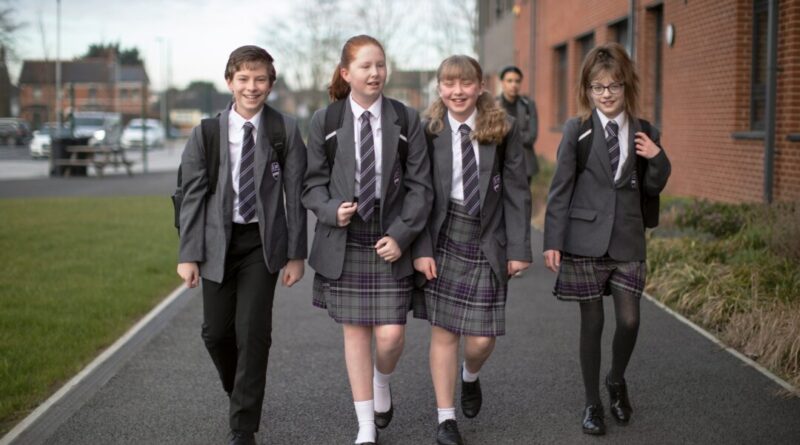New Guidelines Recommend Against Teaching Gender Ideology in Schools
The guidance emphasizes that ‘gender identity’ should not be presented as fact and grants parents the right to review materials utilized in sex education classes.
New government guidance issued to protect children suggests that schools in England should avoid teaching the “controversial” topic of gender ideology.
The guidelines, published on Thursday, state that no sex education should be provided to children before year 5, when they are 9 or 10 years old.
Parents will have access to the resources used for teaching their children Relationships, Sex, and Health Education (RSHE) lessons, following concerns over “disturbing materials” being used in this subject.
The government plans to make these guidelines mandatory after a public consultation, requiring schools to comply with them. However, with a general election imminent this year, a Labour government could potentially scrap them. Currently, schools must have a valid reason for not adhering to the guidelines.
A statement from the Department for Education stated that the objective of the new guidelines is to ensure the content is “factual, appropriate, and comprehensible for children.”
‘A Purely Scientific Standpoint’
According to the draft guidelines, any sex education provided in primary schools for years 5 and 6 should be delivered “from a purely scientific standpoint,” focusing on conception and birth.
The publication of the guidelines was expedited following the Cass Review into “gender care” for children, which exposed inappropriate pathways young people had been placed on after reporting feelings of gender dysphoria.
The guidance specifies that once in secondary school, students should learn about legally “protected” characteristics, like sexual orientation and gender reassignment, but schools should refrain from presenting gender identity or gender ideology as established facts.
Gender ideology, which posits that an individual can be “born in the wrong body,” challenges the idea that transgenderism is a mental health condition and suggests that a person can identify as “non-binary” instead of acknowledging the biological binary of two sexes.
A statement from the Department for Education, released alongside the guidelines, emphasized the need for schools to take a cautious approach in teaching this sensitive subject, avoiding materials that present disputed views as facts, such as the notion that gender exists on a spectrum.
The statement added, “This aligns with the Department’s gender questioning guidance, which advocates a careful approach to assist teachers in prioritizing children’s best interests.”
Sunak ‘Horrified’
Prime Minister Rishi Sunak expressed shock over reports of inappropriate content being presented in classrooms, stating that parents trust schools to provide a safe environment for their children.
Education Secretary Gillian Keegan, in the guideline’s foreword, highlighted the importance of ensuring that sex education imparts essential information while preserving the innocence of childhood by not overexposing children too soon.
“That is why this updated guidance includes specific age restrictions for teaching sensitive content and explicitly prohibits the teaching of the disputed topic of gender identity,” she explained.
Helen Joyce, director of advocacy at the charity Sex Matters, welcomed the change in approach, noting that it addresses concerns about age-inappropriate and unscientific content being integrated into PSHE lessons by transgender advocacy groups.
Joyce emphasized the need for consistency and clarity to ensure accurate and sensitive education on sex, relationships, and physical development, while safeguarding children effectively.
“This marks the beginning of essential government actions aimed at eliminating harmful and evidence-lacking transgender ideology from schools,” Joyce added.
Access Wrongly Denied to Parents
Parents have often been denied access to the materials used in teaching their children RSE, citing copyright restrictions as a reason. However, the new guidelines assert that schools should provide parents with access to these materials and clarify that this does not violate copyright laws.
Additionally, the guidance includes a section on suicide prevention within the secondary health and well-being curriculum, aiming to equip students to identify signs of distress in themselves and their peers.

The guidance also touches on sexual harassment and sexual violence, addressing abusive behaviors like stalking, grooming, and revenge porn, while providing guidance to educators on handling “misogynistic online influencers.”
While discussions on the risks of inappropriate online content, such as pornography, can be introduced in an age-appropriate manner from year 7, explicit details about sexual activities should not be discussed until year 9.
Likewise, the guidance stresses the importance of students understanding concepts like consent in relation to sexual violence and abuse but prohibits discussions on these topics in a sexually explicit manner before year nine.
Concerns Raised By Unions
Although parents and advocacy groups welcoming the guidance as a step towards addressing gender ideology concerns, some charities and teaching unions expressed reservations about the age restrictions.
The National Association of Head Teachers (NAHT) urged the government to provide evidence supporting the notion that rigid age limits enhance support, protection, and safeguarding for students.
The guidelines allow for flexibility in age limits for teaching certain topics if required to address immediate safeguarding concerns. Schools must notify parents in advance if a topic is being introduced earlier than anticipated.
Paul Whiteman, NAHT general secretary, emphasized the importance of acknowledging that some children seek information from external sources outside school, underscoring the need for proficient handling of resulting questions by trained professionals.
Catherine McKinnell, Labour’s shadow education minister, expressed concerns about the lack of consultation with school leaders in formulating the guidelines and cautioned against proposing age restrictions amid rising levels of sexual offenses against children.
Since September 2020, relationships and sex education has been compulsory in secondary schools in England, while relationships education has been mandatory in primary schools.
PA Media contributed to this article.





